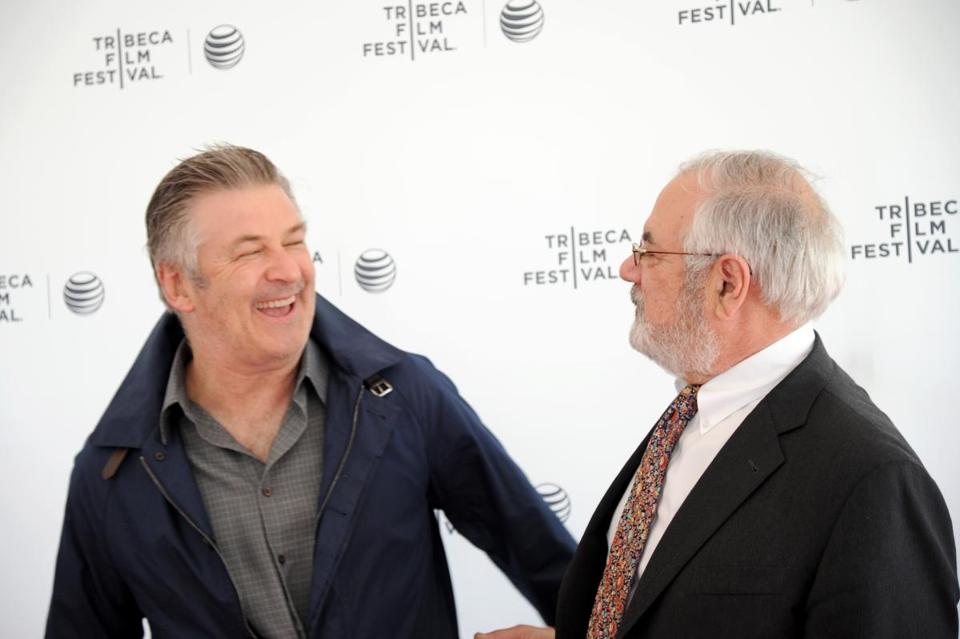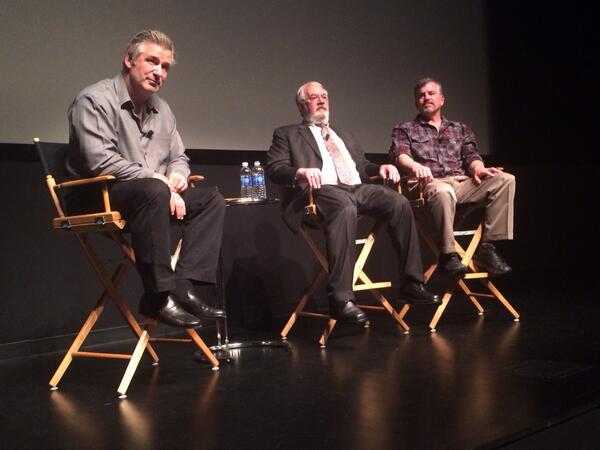Sitting in a packed theater in New York City’s School of Visual Arts, Barney Frank got his first look at Compared to What: The Improbable Journey of Barney Frank, the poignant and tenderly humorous documentary about the life of one of our most well known yet least understood political figures. Executive produced by Alec Baldwin, the film made its world premiere at this year’s Tribeca Film Festival and welcomed a very enthusiastic—not to mention emotional—response from the audience. Providing a rare and intimate portrait of the US’s first openly gay congressman, documentarians Sheila Canavan and Michael Chandler chronicle both the professional and personal trajectory of this endearingly cantankerous politician.
Spanning Frank’s forty-year career in Congress, the film recounts his early experience as a closeted politician in 1970s Massachusetts, including the internal struggle that ensued when Frank realized the conflicts posed between his sexual orientation and political ambitions. In the film, Frank reveals how he avoided sex for many years for fear of being exposed; and how he eventually came out after seven years in Congress when a book written by a colleague revealed his sexuality. At one point in the film, journalist Mike Barnicle recalls that House leader Tip O’Neill once sorrowfully declared to him that Frank’s career was over now that he was about to “come out of the room.” Quite the opposite occurred, however: instead of a professional demise, Frank received overwhelming support from the public and continued to serve in the House of Representatives for the next 32 years, in which he won every subsequent election by a wide margin.
Featuring a plethora of archival footage, candid interviews, and delightful clips of his outspoken public appearances, the film addresses both the highs and lows of Frank’s career—including the 1989 scandal in which it was revealed that he was romantically involved with his live-in aide, and was accused of allowing him to run a prostitution ring out of his home (a charge that he was ultimately cleared of). Known for being boisterously insightful with a dash of charming belligerence, Frank is a rare and genuine gem in the political arena—and through clips of congressional hearings, the audience gets an exciting look at how this maverick politician unapologetically navigates the ignorance of his colleagues; all the while passionately asserting his progressive platforms and giving a voice to the people and issues commonly marginalized by society.
Throughout the shooting process, Frank granted the filmmakers full access to his home and daily life; resulting in a rare and tender glimpse of his relationship with Jim Beardy, complete with exclusive footage of their 2012 nuptials. As the documentary unfolds, we become privy to Frank’s endearingly unrefined idiosyncrasies, bumbling mannerisms, refreshing candor, and reflections during those precious moments of privacy. Documentarians Canavan and Chandler draw wonderful parallels between the political and personal spheres: capturing the eccentric dichotomy of how one individual could spearhead national debate and reform following 2008’s financial crisis, yet still drive a ’98 Ford Escort and refuse to own a smartphone. A man who was Chairman of the Financial Services Committee for years, yet still remains solely dependent on the newspaper for staying informed on political affairs.
Following the premiere screening, Frank and his husband Jim Beardy sat down with Alec Baldwin for a Q&A discussion of the film—which included some interesting and even uncomfortable exchanges. At one point, a reporter asked Frank if he was concerned with Baldwin’s participation in the film in light of a recent dust-up in which Baldwin used a gay slur against a newspaper photographer. Frank’s response acknowledged that although the incident was unfortunate, it was more so a generic and impulsive slip of the tongue, and in no way reflective of Baldwin’s views regarding LGBTQ issues: “First of all, each of us is perfectly capable of talking for himself. The notion that when you appear in some common forum with someone, you’re each adopting the other’s views—no, I don’t pay much attention to that. And secondly, I don’t have any problem with it…his outbursts to the contrary notwithstanding, Baldwin has been very supportive of gay rights.”
When asked what he thought of the film overall, Frank’s response was tepid at best: “I appreciate the general sentiment. To be honest, it’s your life and there are some things I would’ve done differently in the film, but I’m very pleased with the general themes.” However, Beardy was much more blunt in expressing his distaste for the film’s inclusion of the 1989 prostitution scandal; “I don’t understand why the moviemakers would want to embarrass somebody who went out of their way to let them make a movie about him.” With Frank sitting silently by his side, the theater transformed into a hush moment of tense unease as Beardy continued; “I didn’t really think that was relevant…his 94 year old aunt is here! She doesn’t need to see that. It’s embarrassing. My mom’s going to see it. It was just kind of rude.” Given that such a prolific scandal would be difficult to omit—not to mention that doing so would be extremely misleading and withholding for a biographical documentary—Beardy’s criticism was ill-informed, personally biased, impolite and unnecessary at best. It’s one thing to act as a protective spouse, but Beardy seemed to altogether overlook the film’s emphasis on Frank’s redemption, political achievements, and positive image in the context of any misguided public vilification.
In fact, Canavan and Chandler perfectly captured the sharp-tongued wit of their entertaining subject, painting a thorough and complex picture of this enigmatic public servant in a way that preserved and respected Frank’s image and integrity throughout. An unflinching, honest, and unexpectedly engaging account, ‘Compared to What’ sheds an intimate eye on this man’s transition from closeted loneliness to living an authentic and uncompromising life as the first openly gay and married Congressperson. Shot in a highly cinema-verite style, this documentary appeals to all audiences, and even non-political junkies will find watching it to be a shockingly pleasant experience.


